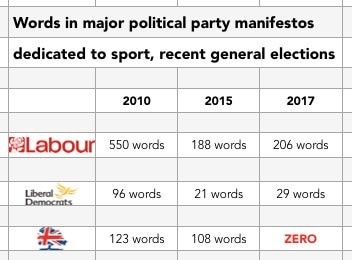Previously, Declan Jordan wrote about the inclusion of sport in the manifesto of various political parties in the run up to the 2016 general election in Ireland. The United Kingdom general election is scheduled to take place on 8 June 2017. As such, I thought it may be interesting to look at the coverage of sport in the manifestos of the three major political parties in the UK – the Conservative Party, Labour and Liberal Democrats.
Sport participation is generally considered to provide a multitude of positive benefits to individuals and society including but not limited to (i) reductions in crime (ii) increases in social capital and social integration (iii) improvements in health through physical activity and (iv) improvements in education outcomes. Studies examining the impact of sport participation on happiness (Huang & Humphreys, 2012), future income (Dewenter & Giessing, 2015), labour market outcomes (Lechner, 2015) have generally found sport participation to provide societal benefits. However, despite these widely held beliefs regarding the positive impact of sport participation on education, health and social issues, the major political parties in the UK tend to allocate very little by way of interest in developing and outlining strategic objectives for sporting activities, at least in their election manifestos.
Table 1 Words in UK Major Party Manifesto Dedicated to Sport
The Labour Party have dedicated 206 words to sport in their manifesto which generally is aimed at decreasing the cost of Premier League matches and advocating supporters trusts appointing at least two directors on the board of British football clubs.
The Liberal Democrats allocate 29 words dedicated to objectives for sport. These are related to introducing ‘safe standing’ at football clubs, requiring the Sports Grounds Safety Authority to prepare guidance for implementing this change.
The Conservative Party, the current governing party and expected by most to comfortably win the general election, have no words attributed to the development of sport in their manifesto for government.
This apparent lack of interest towards sport and sporting activities is perhaps surprising firstly given that the United Kingdom is considered by many to be a leading sporting nation and secondly given the many societal benefits that can spillover from sporting activities.
Recently, I have explored the impact of sports participation on crime in 323 local authorities in England. The results of the working paper indicate that sport participation reduces crime rates for both property and person crimes in English local authorities between 2012 and 2015. The findings suggest that sports participation has a stronger effect on person crimes as opposed to property crimes. The results show that a 10% increase in sports participation leads to a fall in person crimes of 1.30 and 1.56% while a 10% increase in sports participation rates leads to a fall in property crimes of between 0.64 and 0.73%.

 RSS Feed
RSS Feed